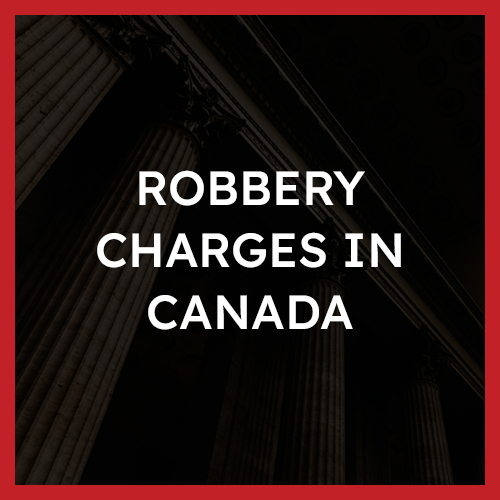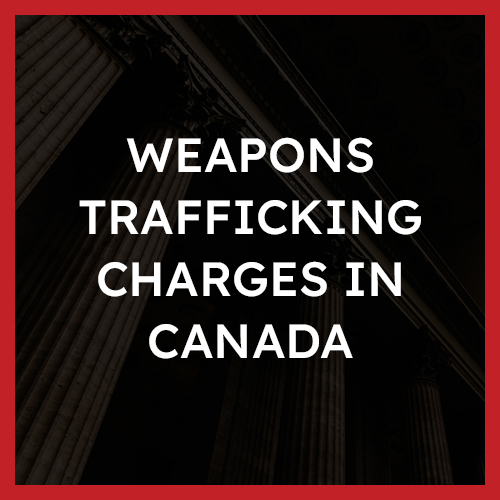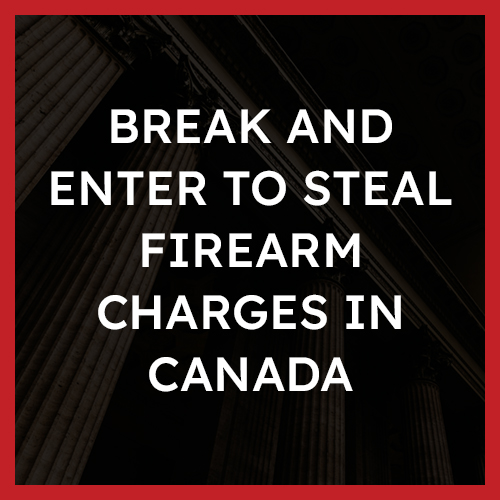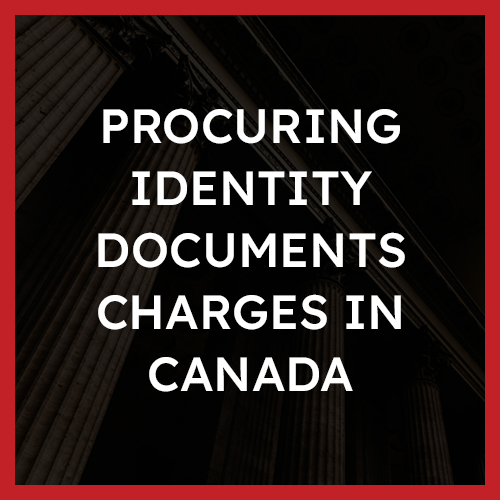Robbery (s. 322 (1)) Charges in Canada: Offences, Defences, Punishments
 What is Robbery?
What is Robbery?
Robbery is a violent property offence that is considered one of the most serious under Canadian criminal law. Individuals charged with robbery are often subsequently charged with other violent offences including assault and theft.
The offence is covered under s. 343 of the Criminal Code of Canada (the “Code”) and is a straight indictable offence, meaning the expected punishment is more serious. There are four primary offences within the parameters of robbery:
- Robbery using violence to extort or overcome resistance;
- Robbery using personal violence at or near the time of the theft;
- Robbery while committing assault with intent to steal; and
- Robbery while armed.
Although the rate of robbery has declined between 2019 to 2021 from 23,371 incidents to 18,530 incidents, this does not mean that local law enforcement agencies are not actively seeking out and laying charges against those suspected of committing robbery. Rather the decline is largely thought to be a result of the COVID-19 pandemic.
Examples
Robbery encompasses several types of offence; however, they all have the underlying commonality that violence or a threat of violence was used:
- Threatening a cashier in a grocery store with a weapon and taking money from the register;
- Striking someone while fleeing a store after grabbing goods;
- Threatening a retail employee with a weapon with intent to steal, however being unsuccessful.
Defences
Every case is different. Defences that may be available in one case may not be available in another. The strength of any defence rests on the evidence against you and the precise details of the allegations.
There are many defences to robbery that can be used. The most common is raising a reasonable doubt as to the mens rea or actus reus of the offence (meaning the mental and/or physical elements of the offence are not made out).
Punishments
Robbery is a straight indictable offence, meaning it is considered very serious and you are likely to receive a jail sentence.
The length of imprisonment you can expect to receive is significantly heightened if:
- A restricted or prohibited firearm was used; and/or
- This was a second or subsequent offence.
The Code advises that the maximum sentence for a robbery charge is imprisonment for life.
Additional minimum punishments are provided as follows:
- Where a restricted or prohibited firearm is used:
- First Offence: Minimum 5 years imprisonment.
- Second or Subsequent Offence: Minimum 7 years imprisonment.
- Where any other firearm is used: Minimum 4 years imprisonment.
In any other instance, there is no minimum punishment provided, however a maximum sentence of life imprisonment remains.
Overview of the Offence
The relevant provision for robbery in the Code is:
Robbery
343 Every one commits robbery who
(a) steals, and for the purpose of extorting whatever is stolen or to prevent or overcome resistance to the stealing, uses violence or threats of violence to a person or property;
(b) steals from any person and, at the time he steals or immediately before or immediately thereafter, wounds, beats, strikes or uses any personal violence to that person;
(c) assaults any person with intent to steal from him; or
(d) steals from any person while armed with an offensive weapon or imitation thereof.
It is critical to remember that in Canada it is your constitutionally protected right to be presumed innocent until proven guilty. This means that the Crown must prove all elements of the offence beyond a reasonable doubt for you to be convicted. If doubt can be raised that you did not complete the physical or mental components of the offence (as described below) the Crown will not be able to secure a conviction against you.
The Guilty Act (Actus Reus)
The actus reus (physical element) for robbery necessary to prove the offence beyond a reasonable doubt requires that the accused stole or intended to steal and:
- The accused used or threatened violence; or
- The accused was armed with a weapon.
The Code defines “steal” for the purposes of the offence as meaning “to commit theft” per section 322 of the Code. You can learn more about the offence of theft here.
The Guilty Mind (Mens Rea)
In addition to the actus reus, the Crown must also prove beyond a reasonable doubt the mental element of the offence. Robbery is a combination of the offences of assault and theft.
Therefore, the mens rea of both offences must be made out as follows:
- The accused intended to use violence or threaten violence; and
- The accused intended to steal.
For example, while looking through a retail store you intentionally place an item in your handbag and proceed to the exit without paying. Just before you make it out a security officer stops you and asks to look into your bag. You cooperate and admit to taking the item. This scenario would be considered theft, not robbery, because there was no violence or threat of violence used.
Robbery Defences
How to Beat a Robbery Charge
As previously mentioned, every case is different. There is no single defence that can be applied to every allegation of robbery. That said, there are numerous defences available that when used effectively can significantly and positively affect the outcome of a case.
In general, the best defences are:
Factual Innocence
This is usually the strongest defence because the facts and the evidence do not support you being there or the property you took actually belongs to you.
Identity
In some circumstances where the offence was not recorded by surveillance footage, or the footage is poor quality, you may be able to raise an identity defence. For example, authorities could have a mistake in identifying you as the perpetrator based on the poor quality of the footage. In order to effectively raise this defence, you may need corroborative evidence, such as an alibi to where you were at the time of the offence.
No Mens Rea/Actus Reus
A common defence available in robbery cases is that you did not use or threaten to use violence during the offence. Without this aspect, robbery cannot be made out.
Violation of Constitutional Rights
The Canadian Charter of Rights and Freedoms (the “Charter”) sets out your rights before and after your arrest. If the police fail to abide by these rights, it could aid in your defence.
While the Crown must prove the elements of the offence beyond a reasonable doubt, you bear the responsibility of raising certain defences at trial. The burden of proof remains high for this kind of prosecution. This means that there are many successful defence strategies that our experienced defence lawyers can employ, depending on the circumstances of your case.
Our lawyers have significant experience assessing the availability and strengths of various potential defences in robbery cases, as well as presenting any and all available defences to the court at trial. Even if you believe that you will be found guilty, it is important that you obtain a legal opinion about defences that may be available to you.
Robbery Punishment
The Code outlines the maximum punishments for robbery as well as minimum punishments in certain circumstances. The offence is considered straight indictable, meaning it is more serious and the Crown will most likely ask for a term of imprisonment.
The maximum punishment for robbery is life imprisonment.
Where a restricted or prohibited firearm is used:
- First Offence: Minimum 5 years imprisonment.
- Second or Subsequent Offence: Minimum 7 years imprisonment.
Where any other firearm is used: Minimum 4 years imprisonment.
The sentence you will receive depends on a variety of factors including:
- Whether the offence was committed in association with a criminal organization;
- The level of harm to the victim;
- The relationship between you and the victim;
- Your criminal history.
In addition to the immediate penalties resulting from a conviction for robbery, it can have wide-ranging negative consequences on your future. You may have trouble securing employment in the field of your choice. This is especially the case for roles that require handling money or valuable items. The lifelong criminal record that results from a conviction can hinder immigration and travel.
Therefore, even if you intend on accepting responsibility for this type of offence, it is worthwhile to explore your options and consider all the possible penalties. A community-based sentence may be obtained even where the Crown is seeking jail time.
Rest assured, our lawyers will work hard to defend you so that you are not saddled with the consequences that stem from a criminal conviction for robbery. In fact, we can canvass a range of sentencing options with the Crown that will impose minimal restrictions on your liberty after sentencing. To learn more about potential non-criminal resolutions, please visit our Resolutions page, or read our FAQ on resolutions and other sentencing options.
Frequently Asked Questions
What is the punishment for robbery in Canada?
The maximum punishment for robbery is life imprisonment.
Where a restricted or prohibited firearm is used:
- First Offence: Minimum 5 years imprisonment.
- Second or Subsequent Offence: Minimum 7 years imprisonment.
- Where any other firearm is used: Minimum 4 years imprisonment.
What type of offence is robbery in Canada?
Robbery is a straight indictable offence which means the punishment will be more severe. It is found under Part IX of the Code, specifically “Offences Against Rights of Property.”
Is robbery indictable in Canada?
Yes. Robbery is considered a serious property offence in Canada and is therefore straight indictable. Individuals found guilty can expect to receive a term of imprisonment as punishment.
Published Decisions
R v Newell, 2007 NLCA 9
The accused was convicted of robbery and appealed to the Supreme Court of Newfoundland and Labrador. One of the key grounds for consideration was whether the accused committed the act of theft or robbery. In this instance the accused left a supermarket with a basket of meat he did not pay for. When a security officer approached him outside, the two individuals got into a “tussle” and the accused had a knife in one hand. The court found that for there to be a robbery, there must be theft and the presence or threat of violence. The accused’s conviction was substituted for theft as when the “tussle occurred” the theft was already complete as the accused had left the store.
You can read the full decision here.
R v Field, 2019 BCSC 2341
The accused was charged with four counts, one of which was a robbery. The accused entered an apartment parkade searching for a vehicle he understood he would be picking up. He saw the victim pull into the parkade and park her vehicle, at which point she remained seated inside. The accused approached her three times. On the first occasion, he approached her window but did not say anything. On the second occasion, she opened the door to speak to the accused, and she believed he attempted to grab the door and get into the vehicle. On the final time, the accused banged his fist on the vehicle window and swore at her. The court found that these actions, although denied by the accused constituted robbery and the accused was found guilty.
You can read the full decision here.
R v Laroche, 2015 ABPC 133
The accused was charged with several counts of robbery whereby he robbed five convenience stores, producing a knife in each incident. At issue was whether the identity of the accused could be confirmed given that his face and head were covered at each incident. Utilizing the testimony of the clerks, as well as CCTV video footage, the court decided that they could only convict the accused on three of the five robberies. Two did not have sufficient video footage and the testimony of the clerks was insufficient to identify the accused.
You can read the full decision here.
About The Author
Ask A Question
We endeavor to respond to questions within 24 hours. If your matter is urgent, please call our office or submit a request for a free consultation.







